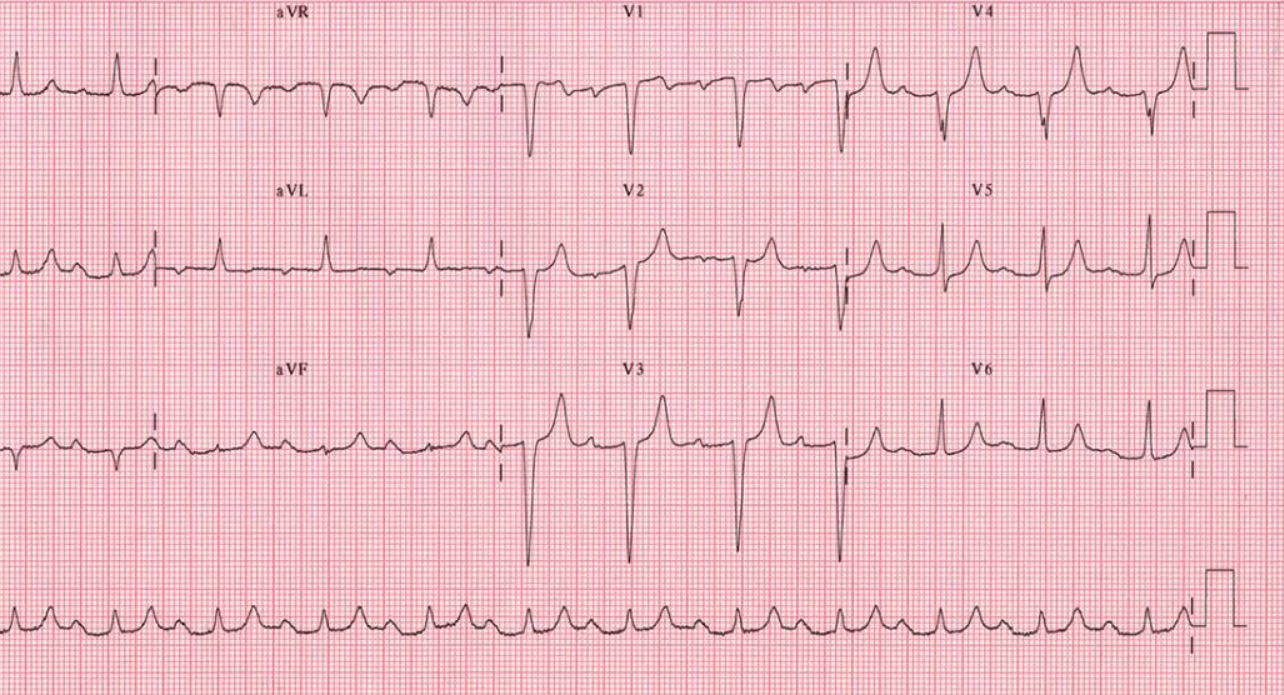Playlist
Show Playlist
Hide Playlist
Cardiac Case: 79-year-old Man with Pacemaker and Recent Dental Procedure
-
Cardiac Case 79-year-old Man with Pacemaker and Recent Dental Procedure.pdf
-
Download Lecture Overview
00:00 A 79-year- old man comes for him scheduled six month visit. 00:04 Three years ago he had a pacemaker implanted for complete heart block which resulted in a syncopal episode. 00:11 He tells us that he feels poorly for the last two weeks following a dental procedure to remove several badly infected teeth. 00:19 He says specifically he feels tired, sweaty, loss of appetite and he’s had recently several shaking chills. 00:27 Blood pressure a little elevated but not bad for a man his age, heart rate slightly elevated, temperature definitely elevated, normal would be 37 and he has signs of an infection. 00:39 His complete blood count shows that his white cell count is 14,000 with 85% polymorphonuclear cells, normal should be less than 10.000 with about 60% to 70% polys so this is clearly there’s an infection somewhere. 00:55 So again, the critical factors - he's had 3rd degree heart block, he was appropriately treated with a pacemaker and there’s a history of a recent infectious process where he had badly infected teeth removed and of course he has symptoms that suggest a fibrile syndrome probably an infection and he’s blood pressure is a little bit elevated but that’s not so worrisome, this is much more worrisome, his fever. 01:20 And again of course the white count with the polys tells us that there’s an active infectious process. 01:27 Here's his pre-pacemaker EKG which shows complete heart block. 01:33 There’s no relationship between the P waves and the QRSs. 01:37 You should take a moment just to look at it to notice that there’s not a P in front of each QRS and of course the heart rate is markedly slow, there’s a wide QRS because that’s a ventricular pacemaker that takes over and again as mentioned no regular relationship between P waves and QRSs and the diagnosis was appropriate, 3rd degree AV block and of course he had a pacemaker implanted. 02:02 This is a little diagram showing you a DDD pacemaker that is it is paces and senses in both the atrium and the ventricle and is inhibited if the heart rate itself is adequate. 02:16 Here’s a chest x-ray from a patient with a single lead VVI pacemaker that is it senses and paces only in the right ventricle not in the right atrium and you can see very easily on this chest x-ray of the pacemaker box implanted. 02:32 Here we see again his 3rd degree heart block, he gets some blood cultures, they grow staph aureus. 02:40 We do an echocardiogram that shows possible vegetation on the pacemaker wire. 02:45 So what do we do? We have to remove both the wire and the pacemaker. 02:49 The patients gets a course of intravenous vancomycin for a long time. 02:53 He gets a permanent pacemaker implantation and then next time he goes to the dentist he needs prophylactic oral antibiotics. 03:02 Now, what happens when we take out the pacer wire? We’ll he’s gonna go back to 3rd degree heart block so very often we have to implant a temporary pacemaker, once we’ve given a few days of intravenous vancomycin.
About the Lecture
The lecture Cardiac Case: 79-year-old Man with Pacemaker and Recent Dental Procedure by Joseph Alpert, MD is from the course Cardiovascular Cases.
Included Quiz Questions
A 79-year-old man presents for his scheduled 6-month visit. Three years ago, he had a pacemaker implanted for a complete heart block, which resulted in a syncopal episode. He reports feeling poorly for 2 weeks after a dental procedure to remove several badly infected teeth. He specifically says that he is feeling tired, is sweaty, has lost appetite, and has several shaking chills. His blood pressure is 145/76 mm Hg, heart rate is 92 beats/min, and the temperature is 39.0°C. A CBC shows a white blood cell count of 14,000 cells/µL with 85% PMN cells. Which of the following is the most appropriate next step for diagnosis?
- Echocardiography
- Cardiac MRI
- Chest x-ray
- Chest CT
- Sputum culture
A 79-year-old man presents for his scheduled 6-month visit. Three years ago, he had a pacemaker implanted for a complete heart block, which resulted in a syncopal episode. He reports feeling poorly for 2 weeks after a dental procedure to remove several badly infected teeth. He specifically says that he is feeling tired, is sweaty, has lost appetite, and has several shaking chills. His blood pressure is 145/76 mm Hg, heart rate is 92 beats/min, and the temperature is 39.0°C. A CBC shows a white blood cell count of 14,000 cells/µL with 85% polymorphonuclear cells. Which of the following is the best next step in management?
- Removal of the pacemaker and IV antibiotics
- Urgent heart valve replacement
- Placement of an implantable cardioverter defibrillator
- Oral antibiotics administration
- Removal of the pacemaker and oral antibiotics
Customer reviews
5,0 of 5 stars
| 5 Stars |
|
5 |
| 4 Stars |
|
0 |
| 3 Stars |
|
0 |
| 2 Stars |
|
0 |
| 1 Star |
|
0 |




